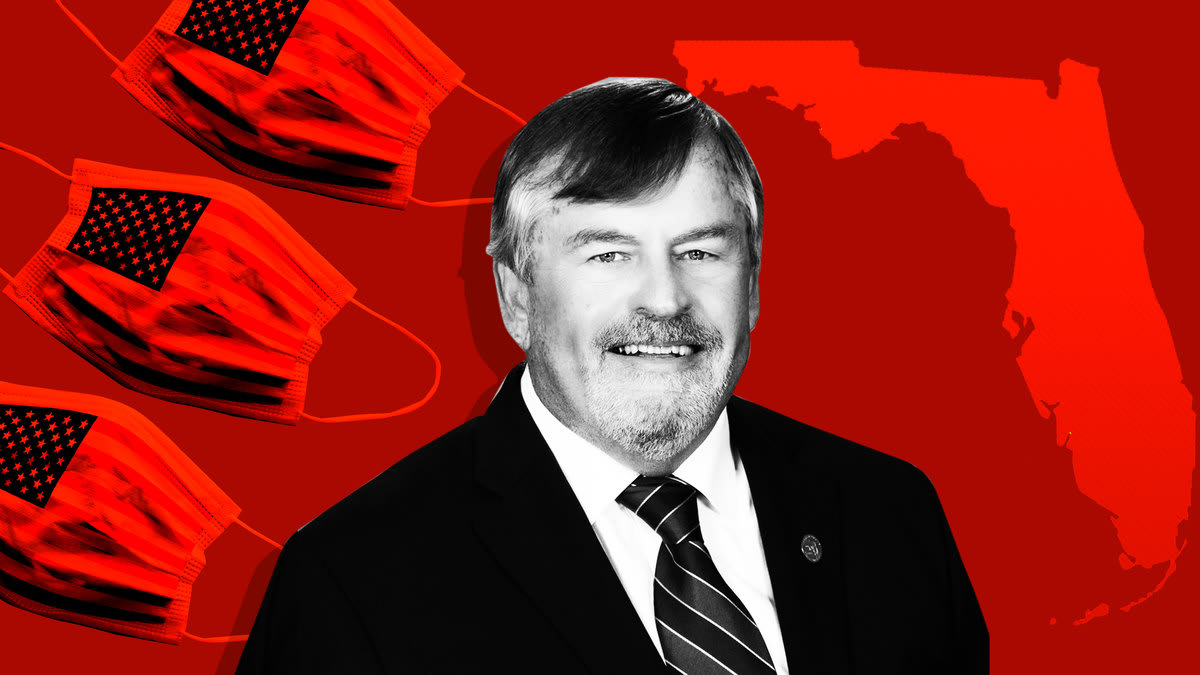Florida County Board Rejected Mask Rule. Then Came an Eerie Cough.
St. Johns County Commissioner Henry Dean was pushing a mask mandate. Now he’s rooting for a colleague to get off a ventilator.

Photo Illustration by The Daily Beast/Getty/Handout
The eeriest single cough ever heard in a municipal proceeding came at a July 7 meeting of the St. Johns County Board of Commissioners in northern Florida.
The cough was carried over the speaker system shortly after Commissioner Henry Dean attempted for a second time to get the board to consider a mask mandate as coronavirus cases surged across the state. None of the other four commissioners had been willing even to consider his motion when he first offered it the week before.
His July 7 effort did have public support in the person of a veteran nurse practitioner named Pam Linder.
“I’m here today because y'all walked away from the mask ordinance last week,” she said. “It’s more important this week… We are having people die in this county.”
She reminded the commissioners, “Your job is to protect and serve.”
She went on, “Vote on it today. I want to be alive next year and I don’t want to be in the grave.”
The nurse was followed by the older sister of a guy who had gotten a COVD-19 test on June 28 and was still awaiting the result. He was, in the meantime, quarantined from the rest of the family.
“We are making this effort and we don’t even know if he is positive,” she said. “Now I asked you to do the responsible thing and pass a mandate for masks in public.”
She noted, “Masks and social distancing are literally our only defense against this virus.”
Commissioner Dean had come to the same conclusion after following the pronouncements of such scientific experts as Dr. Anthony Fauci. The St. Johns County health director, Dr. Dawn Allcock, also endorsed mask wearing. The only mystery for Dean was why anyone would oppose it.
“I don't even see what the argument is about,” he later told The Daily Beast. “You gotta wear a mask. To me, it only makes good sense.”
Dean—a water resources expert on projects including the Everglades—began his remarks on July 7 on a conciliatory note, saying that the entire board shared the same priority.
“The health and safety of our residents,” he said.
He asked them to consider some statistics. The number of COVID-19 cases in the county had risen in five weeks from 250 to 1,300.
“Do the math,” he said. “That’s five times.”
He allowed that he finds his mask inconvenient.
“It fogs up my glasses when I read a motion,” he said.
But, he noted, such annoyances were nothing compared to the alternative. And it was the alternative that spurred him to bring up the issue at the meetings.
He said he was familiar enough with Robert’s Rules of Order to know he could not reintroduce the motion when it had not even been seconded the week before. But there was nothing to stop him from asking his fellow commissioners to reconsider.
“That’s all I can do and I do what I can do,” he said. “I’ll leave it at that.”
The board chair, Commissioner Jeb Smith, thanked Dean for following procedure.
“Any discussion from the other board members?” Smith then asked.
There was only silence from the other commissioners, two of whom, Paul Waldron and Jerimiah Ray Blocker, were attending remotely by telephone.
“Alrighty,” Smith said.
That was that for the mask mandate. The meeting proceeded on to such matters as zoning and road right of ways. The board voted unanimously on each occasion.
Prior to one vote, Waldron volunteered over the speaker system that he had met informally with two of the parties involved.
“I just want the record to say that,” Waldron added.
In the next moment, Waldron coughed—just once.
That was 43 minutes into the meeting, and the cough sounded like not much more than clearing a throat and did not likely strike anybody as significant. The meeting had moved on to an “RV resort and campground” 11 minutes later, when County Attorney Patrick McCormack, asked to bring something to the chair’s attention.
“I just wanted to mention for the record, Commissioner Waldron has had to leave the meeting,” McCormack said. “I believe he will be away for the rest of the meeting.”
Dean did not grasp the full meaning of the announcement until the next day when he saw something Waldron’s daughter posted on Facebook.
“My daddy, Paul Waldron, was diagnosed with the COVID virus,” Ashley Waldron Zapata had written. “Due to complications from the virus, he went into septic shock and has many organs struggling. He is currently in the most critical of conditions... Please keep your family safe and pray for mine.”
Posted by Ashley Waldron Zapata on Saturday, July 25, 2020
Dean learned that Waldron had gotten off the phone the night before because he had become too ill to continue and was suddenly in urgent need of medical assistance.
“It was kind of a weird feeling that he was on the phone with us and in the midst of that meeting was so so sick they had to take him to the emergency room,” Dean later said.
Waldron was admitted to the ICU and placed on a ventilator. Dean spoke of him with genuine affection, noting that Waldron was active in charities and county civic organizations.
“He’s a wonderful human being,” Dean said. “He is just a great guy and it’s terrible he’s suffering as he is.”
Dean said he cannot explain why Waldron and the other commissioners opposed a mask mandate. State laws prevents him from having private discussions with them about matters before the board. And every time he has pushed the board to consider a mask mandate, he has been met with the same silence.
“I can’t call up my fellow commissioners and say, ‘What is your problem?’” Dean noted.
St. Johns County encompasses Saint Augustine and Saint Augustine Beach, which both have mask mandates. Dena sees near-universal compliance in those municipalities, but an alarming number of bare faces in the county's unincorporated areas.
By Dean’s math, one less person infected with COVID-19 is also one less person who will infect others. Dean figures he will keep pushing the board at each meeting while hoping that Gov. Rick DeSantis will follow the example of most the rest of the country and issue a statewide mask mandate.
“Even Alabama has a state mandate and we don’t,” Dean said. “That’s kind of embarrassing.”
The local mask and social distancing mandates that do exist in Florida seem to be helping to level off Florida’s virus spike. The state set a new record for fatalities on Monday and again on Tuesday, but new infections and hospitalizations are slightly down
In St. Johns County, there is no leveling off yet. More than three weeks after that eerie lone cough over the sound system, infections there are up another 2,624 to 3,136.
Waldron continues to fight for his life.
“He’s still on a ventilator,” Dean said.




